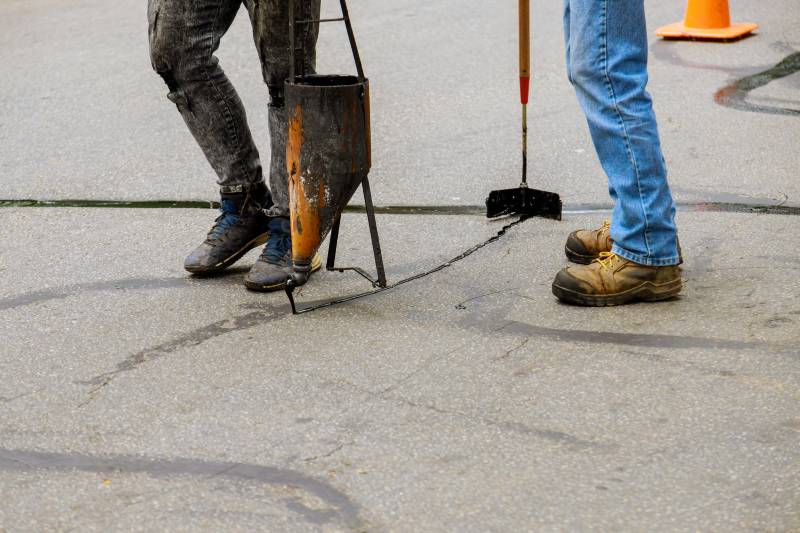Asphalt is a durable material commonly used for roads, parking lots, and driveways, but without proper maintenance, it can deteriorate quickly. Two of the biggest threats to asphalt surfaces are water intrusion and exposure to chemicals. However, there is one effective solution to protect against these threats – asphalt sealcoating. This protective layer serves as a barrier between your asphalt and the elements, extending the life of your pavement.
In this blog post, we explore how sealcoating can shield your asphalt from water and chemical damage, preventing high repair costs and keeping your surface looking its best.
Understanding the Risks of Water Intrusion
Water may seem harmless, but when it comes to asphalt surfaces, it can cause major damage over time. When water seeps into tiny cracks and crevices, it weakens the asphalt binder and the structure of the material. Over time, this leads to problems such as:
- Erosion: Water erodes the base layers of the asphalt, causing surface deterioration and instability.
- Cracks and Potholes: Moisture trapped beneath the surface weakens the pavement, resulting in cracks, potholes, and other damage.
- Foundation Damage: Deep water penetration can compromise the foundation of your asphalt, making the surface uneven and unsafe.
Without protection, water intrusion can lead to extensive repairs that are costly and time-consuming. Fortunately, regular sealcoating can help avoid these issues.
How Sealcoating Protects Against Water Intrusion
Sealcoating acts as a waterproof barrier, sealing the small cracks and pores that allow water to penetrate the asphalt. By preventing water from entering these tiny spaces, this protective barrier helps avoid freeze-thaw cycles in colder climates, where water freezes and expands, leading to more extensive cracking.
Additionally, sealcoating minimizes the risk of water pooling on the surface. Water pooling on asphalt pavement and roads can cause surface erosion, especially in areas that experience heavy rainfall. With a properly applied sealcoat, your asphalt will have enhanced durability against water damage, ensuring that it remains smooth and functional for years to come.
The Impact of Chemicals on Asphalt Surfaces
Asphalt is not just exposed to water; it also faces the damaging effects of various chemicals. Some of the most common chemicals that can deteriorate asphalt include:
- Oil and Gasoline: Leaks from vehicles on your asphalt driveway or roadway can cause serious damage to asphalt, softening the material and causing it to break down. This type of damage increases surface voids and damage from UV rays.
- De-icing Salts: While necessary for road safety in winter, de-icing salts can be highly corrosive to untreated asphalt surfaces.
- Industrial Chemical Spills: In commercial settings, chemicals used for cleaning or production can spill onto asphalt surfaces, weakening the material over time.
When these chemicals penetrate the asphalt, they break down the bonds that hold the surface together, leading to cracks, crumbling, and an unsightly appearance. Luckily, sealcoating can provide a protective shield against these chemical hazards.
How Sealcoating Shields Against Chemical Damage
Sealcoating is specifically designed to be chemical-resistant. It creates a protective layer that prevents oil, gasoline, and other chemicals from seeping into the asphalt. Instead of penetrating the surface, these substances remain on top of the sealcoat, where they can be easily cleaned off without causing permanent damage.
This is especially important in areas like parking lots, where oil and gasoline spills are common. By applying sealcoating, you not only prevent chemical degradation but also preserve the aesthetic appeal of your asphalt, keeping it smooth and clean.
The Importance of Regular Sealcoating
To maximize the benefits of sealcoating, it’s essential to apply it regularly. Most asphalt surfaces should be sealcoated every 2 to 5 years, depending on traffic volume and environmental exposure. Regular sealcoating prevents minor damage from becoming a bigger problem, saving you money in the long run.
Here’s why regular sealcoating matters:
- Prevention of Cracks and Erosion: A fresh coat of sealant ensures that water and chemicals are kept out, reducing the risk of cracks and foundation damage.
- Prolonged Lifespan: Regular maintenance can extend the life of your asphalt surface by years, delaying the need for costly repairs or replacement.
- Enhanced Visibility of Signage and Pavement Markings: Sealcoating creates a dark and smooth surface that makes re-striping lines and markings more visible for improved overall safety. Lone Star Paving also offers road and parking lot striping services in Austin and beyond.
- Cost-Effective: Sealcoating is far less expensive than repairing or replacing damaged asphalt. This regular asphalt maintenance is an investment that pays off by preventing long-term damage.
Protect Your Asphalt Today with Professional Sealcoating in Austin
Sealcoating is an essential part of protecting asphalt surfaces from water intrusion and chemical exposure. Without it, your asphalt is vulnerable to cracking, erosion, and deterioration. By applying a protective layer of sealcoating every few years, you can keep your asphalt strong, smooth, and resistant to the elements.
For professional asphalt sealcoating in Austin, reach out to Lone Star Paving today. Our team of professionals ensures that your asphalt is properly sealed and ready to withstand the toughest conditions. Don’t wait until damage occurs – protect your investment with high-quality sealcoating by contacting us today!

